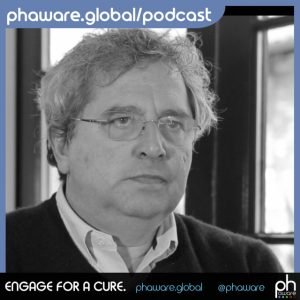Phaware Podcast: Richard N. Channick, MD

This podcast series, created and produced by phaware, is being offered as a regular guest feature on Pulmonary Hypertension News to bring the voices and life experiences of PH patients, family members, caregivers, healthcare specialists, and others to our readers. You may listen to the podcast directly, or read it via the transcript that runs below.
I’m Aware That I’m Rare: Richard N. Channick, MD
The phaware™ interview
Dr. Richard N. Channick discusses clinical trials and the process of how new therapies are developed for patients. He is the director of the Pulmonary Hypertension and Thromboendarterectomy Program at Massachusetts General Hospital in Boston. Dr. Channick diagnoses and treats patients with a variety of diseases of the pulmonary blood vessels, including PH and pulmonary embolism.
I’m Richard Channick. I’m a pulmonary critical care specialist and director of the pulmonary hypertension program at Massachusetts General Hospital in Boston.
Today, I would like to talk a little bit about clinical trials. Clinical trials, or testing of new treatments, is how we develop these  treatments. The only way one can get a new treatment, get it approved, and get it to patients is by doing properly conducted clinical trials. There’s a very rigid system for how this should be done to ensure safety of patients and to ensure proper testing. The clinical trial process is intrinsic in getting any kind of therapy to patients.
treatments. The only way one can get a new treatment, get it approved, and get it to patients is by doing properly conducted clinical trials. There’s a very rigid system for how this should be done to ensure safety of patients and to ensure proper testing. The clinical trial process is intrinsic in getting any kind of therapy to patients.
There are many concerns patients have, rightfully so, when it comes to clinical trial and their participation in the trial. The first is that, and sometimes there’s a misconception that by going to a clinical trial, they’re actually guaranteed a treatment, and one has to explain that many of these trials, like most of the trials, have a placebo group. So, they may not be getting any active treatment. And they have to understand that. Now, we have situations, clauses set up to ensure safety. So, if the patient’s getting worse, they can come out of the trial and actually go onto the active treatment. So, we usually can reassure patients that even if they’re quote, “in the placebo group,” that we won’t allow anything bad to happen without having a plan, what we call a rescue plan.
Secondly, and this is very important, the reason why we’re studying these drugs is because we don’t know if they work. So, I don’t think patients can assume because they’re getting this experimental drug, that they’re being guaranteed an effective treatment. That’s why we’re doing the study, and we’re trying to do the study to find out if it’s effective and if it’s safe. So, there’s the two sides of the coin. Patients need to understand that usually by the point a drug gets to a certain phase in the clinical trial development, we call it Phase 3, there’s some pretty good evidence that the drug has benefit. But we need to do these bigger trials, these Phase 3 trials, to really prove that. I think patients need to understand what they’re getting into.
In every clinical trial, we have what we call inclusion factors and exclusion factors, and we try to design these trials to test the treatment in the best possible way to give the highest chance of success. With pulmonary hypertension, it’s complex, because pulmonary hypertension is not one disease. It’s many diseases. When we’re trying to design inclusion and exclusion criteria, we have to take that into account. We can’t, for instance, take a treatment and apply it to every patient with pulmonary hypertension. We know very clearly and have clear experience that drugs that work for some forms of pulmonary arterial hypertension won’t work for other forms and, in fact, can make things worse. So, we really have to think about all those things.
There are many ways to research, and pulmonary hypertension, obviously, with everyone being online, there are many different sources. There’s something called ClinicalTrials.gov, which is a government website where every registered clinical trial is listed. Now, that can be a little bit user-unfriendly to go on there and try to find every trial. Probably an easier way is to ask your physician, and especially if your physician is a PA specialist.
One of the motivations behind forming an accreditation program for the pulmonary hypertension centers is that it would give patients a resource by which they could know where to go, know who to contact. And, certainly, any expert in pulmonary hypertension, whether or not they’re even at an accredited center, will either be doing those clinical trials or will be aware of all the trials. Going to the PA specialist is probably the single most efficient way of figuring out where the trials are.
Once a patient is in a clinical trial, there’s a very rigid schedule for what needs to be done, and these trials have to be done in a very uniform way. The patient, again, has to understand what they’re committing to, that this is not something that we want, three weeks into it, for someone to say, “Well, you know, I don’t really want to do this anymore.” Now, obviously, that can happen at times, but before we even start, we want to feel very confident that a patient really is going to quote, “stick with the program,” and at each study visit, have all the testing that’s been described to them will be done.
The principal investigator is kind of ultimately in charge of all of that. He or she really has to make sure the study’s being conducted properly, that all the paperwork’s in order, all that stuff. The study coordinator is the one who kind of implements a lot of it, so they’ll be collecting information from the patients, whether it’s questionnaires, whether they’re doing walk testing. All the different things that are done at a study visit will typically be done by the coordinator.
Participation in a clinical trial really is a great commitment on a patient’s part, and in a good way. I think first and foremost, we make it very clear that the reason we’re studying a treatment is because we don’t know if it will help that individual person. They’re really making a selfless gesture, if you will, by going into the trial, and it may help future patients. We may find that this drug wasn’t beneficial, and that is helpful, as well, to understand what doesn’t work. Although, if the drug turns out to be effective, and the patient gets benefit, the study subject gets benefit, then that’s obviously a very positive thing. But I think the concept of doing this for other patients, to benefit the community, to benefit the knowledge about the disease, is really what should drive a person to want to participate.
We have so many patients who have contributed to developing now over a dozen treatments in pulmonary hypertension that could never have been done without these patients. I can remember, and in fact, I still care for some of them, who were like the first patients enrolled in the very first trial. I recently got correspondence from somebody who was on the first oral therapy approved in like 2001, and this patient was, I think, the very first subject enrolled in that first trial of an oral therapy, you know, back in the late ’90s. She’s still on the treatment, and she brags how she thinks she was like the number one first patient enrolled and was actually very, very proud of it. And she’s doing great.
My name is Rich Channick, and I’m aware that I’m rare.
EVERYBODY HAS A STORY. WHAT’S YOURS?
phaware wants to share your pulmonary hypertension story with their engaged global audience. Whether you are a patient, caregiver, or medical professional, they are enlisting PH community members from across the globe. Visit www.phaware.global/podcast to share your story and to be considered for a future episode. And learn more about pulmonary hypertension at www.phaware.global. #phaware #phawarepod
***
Note: Pulmonary Hypertension News is strictly a news and information website about the disease. It does not provide medical advice, diagnosis, or treatment. This content is not intended to be a substitute for professional medical advice, diagnosis, or treatment. Always seek the advice of your physician or other qualified health provider with any questions you may have regarding a medical condition. Never disregard professional medical advice or delay in seeking it because of something you have read on this website. The opinions expressed in this column are not those of Pulmonary Hypertension News or its parent company, Bionews Services, and are intended to spark discussion about issues pertaining to pulmonary hypertension.










Leave a comment
Fill in the required fields to post. Your email address will not be published.